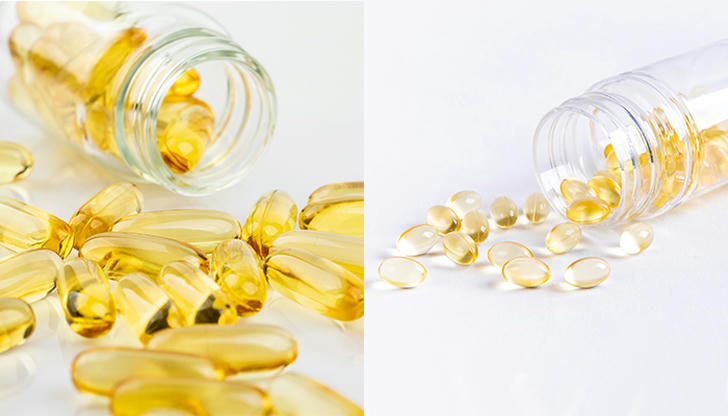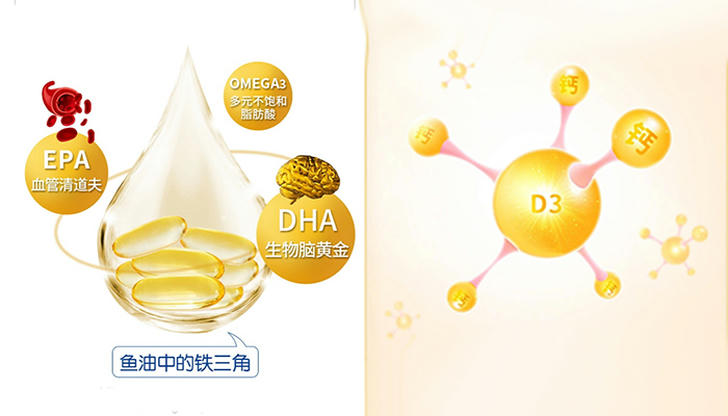Unveiling the Superior Choice: Fish Oil vs. Cod Liver Oil

Fish oil and cod liver oil are both popular dietary supplements, but what’s the difference between them? Actually, the main components of fish oil are unsaturated fatty acids, while the main components of cod liver oil are vitamin A and vitamin D. Incorrect usage of these supplements can potentially lead to an overdose. Let's explore how to make the right choice between them.
Fish oil - The body fat of the deep sea fish.

We have all heard of saturated fatty acids and unsaturated fatty acids. Unsaturated fatty acids are beneficial to the human body in lowering cholesterol and triglyceride levels and enhancing memory. The main components of fish oil are unsaturated fatty acids, which are also known as DHA (docosahexaenoic acid) and EPA (eicosapentaenoic acid).
DHA is a vital element for sustaining brain function, often referred to as 'brain gold.' It supports the growth of brain cells and can help alleviate issues like mental decline, forgetfulness, and even Alzheimer's disease. On the other hand, EPA enhances blood circulation, lowers blood viscosity, and reduces the risk of atherosclerotic plaque and thrombosis formation. This is particularly beneficial for individuals dealing with hypertension, high blood pressure, and elevated cholesterol levels. Additionally, EPA promotes the production of joint lubricating fluid, which reduces joint pain and helps prevent arthritis, making it a favorite among middle-aged and elderly individuals.
Cod Liver Oil - Fatty Oil from Fish Liver

Cod liver oil is derived from the liver of fish, primarily containing vitamin A and vitamin D, with minimal unsaturated fatty acids. Vitamin A, also known as retinol, not only supports normal vision but also plays a crucial role in bone growth and helps prevent skin conditions like keratosis pilaris.
Furthermore, cod liver oil enhances the body's ability to absorb calcium. Vitamin D, with its positive impact on bone growth, facilitates the absorption of calcium and phosphorus, effectively preventing conditions such as rickets and improving osteoporosis. Many cases of calcium deficiency can be attributed to a lack of vitamin D in the body.
Who Should Consider Fish Oil or Cod Liver Oil Supplements?

• Coronary heart disease patients: In patients with a history of myocardial infarction and coronary atherosclerosis, fish oil supplementation can reduce the mortality rate due to coronary heart disease by about 10% if combined with hyperlipidemia.
• Heart failure patients: if combined with hyperlipidemia, fish oil supplementation can reduce mortality and related hospitalization rates by about 9%.
• Picky eaters, pregnant women with severe vomiting. These groups can take fish oil supplementation in moderation when they are unable to meet their body's nutrient needs due to an unbalanced diet that does not adequately replenish unsaturated fatty acids from food.
• People who need to supplement cod liver oil in moderation
• People who are deficient in Vitamin A and Vitamin D can take appropriate supplements of cod liver oil.
• People with night blindness.
• People with rickets.
• Children with tetany.
What You Should Know Before Taking Fish Oil and Cod Liver Oil Supplements

• Fish oil is not suitable for people with hemophilia or blood clotting disorders and gout.
• Fish oil or cod liver oil is not recommended for those who are highly allergic to seafood.
• Long-term consumption of cod liver oil is not recommended for those who are physically weak, suffering from urinary tract stones or simply supplementing vitamin D.
• Chronic renal failure patients are not suitable for taking cod liver oil, and anemia patients should also be cautious.
• Middle-aged and elderly people taking cod liver oil for a long time should pay attention to drinking more water to increase urinary excretion, to prevent causing urinary tract stones.
Dosage Guidelines

Fish oil: It is generally believed that the average adult needs 200mg of DHA per day, which is equivalent to 1g of fish oil per day for those who don't eat fish, and should not be supplemented with more than 3g of fish oil per day. for better protection of blood vessels, it can also be taken with lecithin at the same time.
Cod liver oil: Generally speaking, vitamin A consumed in the daily diet can satisfy the needs of the human body and does not need additional supplementation. While vitamin D needs to be obtained through long time sun exposure, for those who can't guarantee the sun exposure time, it is difficult to supplement in sufficient amount, and additional supplementation can be considered. If the body is not deficient in vitamin A, the process of supplementing vitamin D through cod liver oil should consider the risk of nausea, hair loss, dry and flaky skin that may be caused by an overdose of vitamin A.
TIPS
Not everyone needs to take fish oil or cod liver oil supplements. It is also important to note that fish oil or cod liver oil-based supplements are not a substitute for medicines, and it is best to consult your doctor before using them, rather than taking them blindly on your own.

